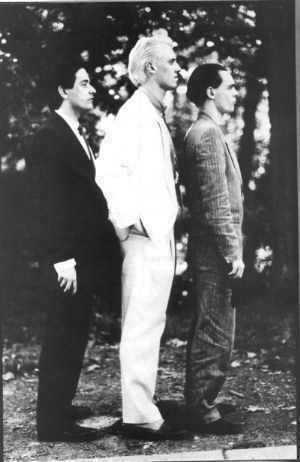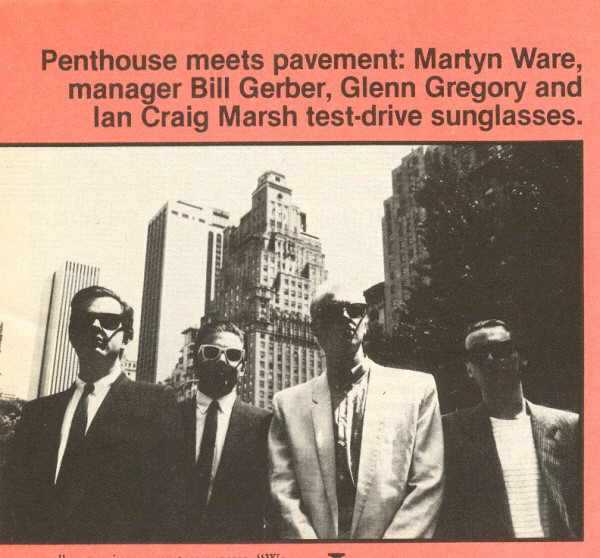ARTICLES AND REVIEWS
Heaven 17 faces right - By Jon Young in Trouser Press September 1983
If Dickens hadn't gotten there first, "Great Expectations" would be the perfect title for the saga of Martyn Ware and Ian Craig Marsh. After their bitter departure from the Human League in 1980, these two synthesizer aces / all-around clever guys embarked on a number of projects that made artistic sense but failed to reach an audience worthy of their grand ambitions.
Incorporating as British Electric Foundation, Ware and Marsh joined forces with vocalist Glenn Gregory, a fellow Sheffield native, to form Heaven 17 (the name of a band in Anthony Burgess' novel "A Clockwork Orange"). The band commences making catchy singles and the frisky Penthouse And Pavement LP, but didn't even secure an American record deal (with Arista) until long after emerging in Britain.
In the guise of parent company BEF, Marsh and Ware released a limited-edition instrumental cassette (Music For Stowaways), a mini-LP (Music For Listening To) with many of the same tracks, and Music Of Quality And Distinction Volume One - an LP of cover versions featuring such time-honored stars as Gary Glitter, Sandie Shaw and Tina Turner. No BEF product has been released domestically.
 | However, Heaven 17's sober, socially conscious pop is finally generating a significant public response. "Temptation", a recent single, made a big dent in the UK charts, with The Luxury Gap LP following suit. Arista has thought enough of that album's commercial potential to fly Marsh, Ware and Gregory to New York for interviews, even though no live dates are planned. The label's efforts appear to be well-spent. During the trio's visit, Heaven 17 will be talking not only to "serious" magazines like Trouser Press but also to lighter fan-mag journals like Tiger Beat. Holding court in the Arista headquarters, loquacious Martyn Ware ("I can talk forever", he boasts) professes to find that media spread not at all suprising. "We've got a pretty wide demographic", he notes. "In Britain, the teen and pop magazines have greater appreciation of what we're doing than the intellectual ones. Initially, the intellectual music press loved us. Then, around the time the Human League became popular [with "Don't You Want Me"] it transpired that you had to be successful in sales terms to have any credibility. The Human League were obviously phenomenally successful, so the British press switched their allegiance. Now they hate us." "It doesn't worry us that much, because the new album went into the UK charts at number four and the single reached number two. The press haven't got their fingers on the buttons at all, which gratifies us greatly." |
This is a far cry from the disappointing performance of the first Heaven 17 single "(We Don't Need This) Fascist Groove Thang". This supremely danceable slab of synth-funk was predestined to chart failure by virtue of its blunt attack on the right-wing powers in Britain and America.
"It didn't get any airplay", Ware note calmly. "The radio stations didn't actually ban it - if the had, sales would have been much greater, 'cause it would have gotten more publicity."
Heaven 17 continues to point a finger at society's villains with songs like "Crushed By The Wheels Of Industry", but Ware is quick to disown the role of crusader.
"We're subversive, rather than engaging in all-out frontal attack. You can only do something like 'Fascist Groove Thang' once, or it becomes a parody of what you originally did. It'd be the easiest thing in the world for us to write protest songs, but it has to be more subtle."
"I can't imagine anything worse than being labeled a protest group; it distracts people from everything else you're trying to do. If people buy our albums because they like the way they sound, that's fine. We'd become one-dimensional, if we started writing 'Margaret Thatcher, it's time for you to leave' ".
Britain's "Iron Lady" is much on Ware's mind. It's two days before the landslide electoral victory that will return the Prime Minister and her fellow Conservatives to office. Everyone expects her to win, but that doesn't make it any easier for Ware to take.
"I find it immensely disturbing", he confesses. "Let me give you some figures: The Conservative Party is spending 20 million pounds on this election campaign and the Labour Party is spending 2,5 million. All the big corporations are pumping vast amounts of money into the Conservative Party in order to maintain their share of the profits. It's all at the expense of the lower-paid and unemployed, of which there are a frightening number.
"England's dying, and it'll continue if she gets in again. It's that bad."
"Thatcher has asset-stripped Britain. She's sold off all the profitable national industries to private enterprise. All the money being generated in Britain is being shipped out of the country because currency restrictions don't exist anymore. The country's being sucked dry. There's not gonna be a Britain in four year's time if she gets reelected."
"Let's talk about something else."
| Gladly ! Compared to the motherlands plight, flop records are a trivial annoyance. Heaven 17 has no plans to tour. "We'ne never played live and we don't want to", Ware says. "It's not economically feasible to tour unless you're prepared to lose money and be in debt to your record company. Thanks to touring, the Human League was 70.000 pounds in debt. That was enough to put us off it for the rest of our lives." "Also, we have very happy privates lives. We have a circle of old friends. Glenn and myself are both married and we like to see our wives. Music is very important for us, but it's not our entire lives, however unfashionable that may sound. We're not part of the rock'n'roll lifestyle." He rejects the conventional wisdom that endless touring guarantees success. "We did 150 gigs with the Human League, and I wish we'd not done one. We sold ten times more of our first Heaven 17 album than our last Human League album (Travelogue) without doing one live date. That proved us conclusively that playing live is not all it's cracked up to be, in terms of promotion and sales. |  |
"It's been proven to us even more by the fact that The Luxury Gap came out in England 18 months after Penthouse And Pavement and it's already outsold it in three weeks."
"It won't make sense for us to tour until we can afford to risk our own money. So we'll decide when we want to and when we can afford to. We don't need anybody else telling us what we should or shouldn't do."
Like the current ban on touring, BEF's very existence is the result of difficult lessons learned in the Human League. In what he describes as his "3.000-word essay", Ware explains that he and Marsh incorporated as the British Electric Foundation to get away from conventional group structure, which encourages factionalism, and to give them more leverage in business matters.
"For some strange reason", ne notes, "people tend to take you more seriously when you're a company."
Ian Craig Marsh, who's just joined the conversation, explains the rationale behind BEF's one major project to date: last year's Music Of Quality And Distinction Volume One.
"Back in the Human League, we used to perform 'You've Lost That Lovin' Feelin' ' at the height of punk, which was regarded as a pretty strange thing to do. We always wanted to do a whole cover version album, but didn't have a chance until BEF."
Music Of Quality And Distinction cost a lot of money to make. It took $10.000 to fly Tina Turner and her bodyguard first-class to London for a day in the studio. Then, after all the sweat, the album didn't sell well and reviews were bad.
Ware admits he got discouraged. "Music Of Quality And Distinction got ripped to shreds in the British press, and never got treated the way it ought to have been. It was meant to be regarded as a high-profile commercial album, not an intellectual project. It was supposed to be a lot of fun."
"After it didn't do well in the charts, and the singles from it didn'd do well, it did cross our minds that maybe we were barking up the wrong tree and perhaps we'd gotten an overinflated view of ourselves."
"I think we're something between breaking even and losing 10.000 pounds on Music Of Quality And Distinction. Eventually we'll probably break even, so it's not the end of the world."
No Volume Two is planned. However, other more modestly-budgeted BEF projects are.
"We've just done an instrumental LP with Nick Plytas, out keyboard player", Ware reveals. "We're planning a series of BEF LPs featuring the session players that are important to the way Heaven 17 sounds. They're not meant to be massive mega-sellers. They're very cheap to do, because we're doing a lot of the work before recording - unlike the Heaven 17 albums, where arrangements and lyric-writing are done in the studio."
"We did the Nick Plytas album in seven days for 7,500 pounds. It needs to sell only 10,000 copies to break even."
The next BEF LP will feature shy 20-year-old bassist/guitarist John Wilson.
"I can't praise him enough", Ware says. "He's just tremendous. Usually we get him down to the studio, he listens to the track a couple of times, and comes up with something totally appropriate."
"He came in an did the solo in the middle of 'Groove Thang' on the second or third take. We couldn't believe it. Up until that point we'd never worked with guitars in our lives. That 30-second segment changed the course of Heaven 17 for all time, because that was when we started leaning more towards black music."
Heartened by the response to The Luxury Gap, Ware and Marsh are already plotting the next Heaven 17 LP. The say it'l sound radically different because they've just acquired an ultra-sophisticated Fairlight synthesizer. The two corporate partners revert to little-boy enthusiasm when describing their new toy.
"You can do anything you want with it", Ware states. "It sounds inconceivable, but it's true."
"You're limited only by your imagination", Marsh adds.
So all's well that ends well - at least for now. Aren't upbeat endings well ? As Ware comments, "Things are definitely getting easier rather than harder. It's about time."

